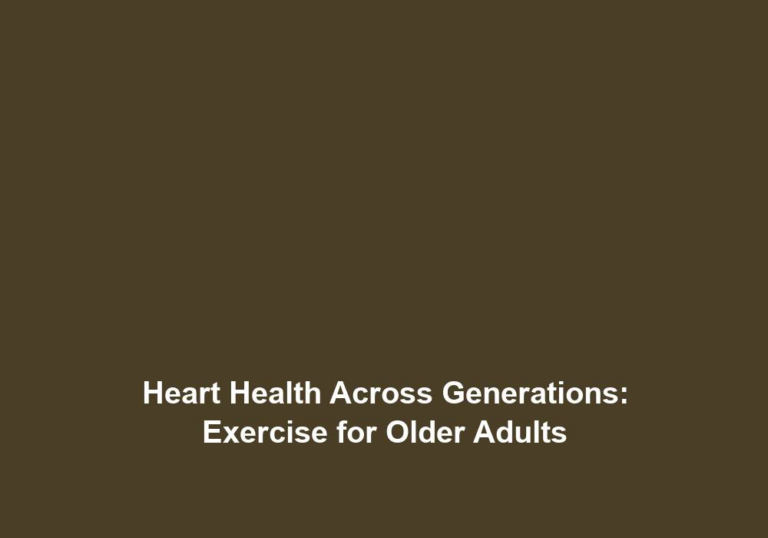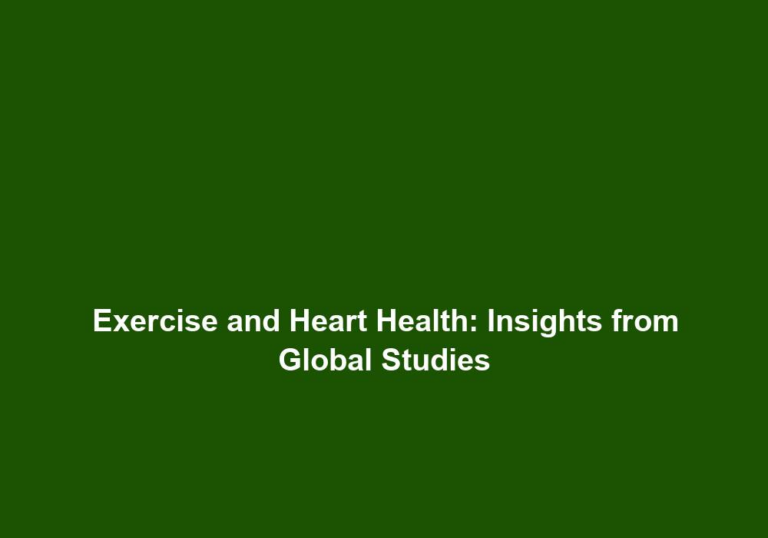Heart Health Discoveries: A Global Perspective on Exercise
In recent years, there have been numerous groundbreaking discoveries regarding the impact of exercise on heart health. From various research studies conducted around the world, it has become increasingly clear that regular physical activity plays a vital role in maintaining a healthy heart. In this article, we will delve into some of the most exciting findings on heart health from a global perspective and explore the benefits of exercise on cardiovascular well-being.
The Global Burden of Heart Disease
Before we dive into the details of exercise and its positive effects on heart health, it is essential to understand the global burden of heart disease. According to the World Health Organization (WHO), cardiovascular diseases are the leading cause of death worldwide, accounting for approximately 17.9 million deaths annually. This alarming statistic highlights the urgent need for effective preventive measures, such as exercise, to combat heart-related issues.
Exercise and Cardiovascular Health
Regular physical activity has been extensively studied and proven to significantly reduce the risk of developing heart disease. It not only improves overall cardiovascular health but also helps manage various risk factors associated with heart-related conditions. Here are some key discoveries showcasing the impact of exercise on heart health:
1. Reduces the Risk of Heart Disease
Research indicates that engaging in moderate-intensity aerobic exercise for at least 150 minutes per week, or vigorous-intensity exercise for 75 minutes per week, can reduce the risk of heart disease by approximately 30%. This includes activities like brisk walking, cycling, swimming, or even dancing. Regular exercise helps control blood pressure, lowers LDL (bad) cholesterol levels, and enhances the overall efficiency of the heart.
Regular physical activity not only improves overall cardiovascular health but also helps manage various risk factors associated with heart-related conditions. Engaging in moderate-intensity aerobic exercise, such as brisk walking, cycling, swimming, or dancing, for at least 150 minutes per week can significantly reduce the risk of heart disease by approximately 30%. This form of exercise helps control blood pressure, lowers LDL (bad) cholesterol levels, and enhances the overall efficiency of the heart. It is important to note that even vigorous-intensity exercise, like running or high-intensity interval training (HIIT), for 75 minutes per week can provide similar benefits.
Aside from reducing the risk of heart disease, regular exercise has numerous other positive effects on cardiovascular health. It helps improve heart function by stimulating the heart and making it stronger and more efficient at pumping blood throughout the body. With consistent physical activity, the heart’s capacity increases, allowing it to deliver oxygen and nutrients to the muscles more effectively. Additionally, exercise helps maintain a healthy heart rate, reducing the workload on this vital organ.
2. Improves Heart Function
Exercise stimulates the heart, making it stronger and more efficient at pumping blood throughout the body. With regular physical activity, the heart’s capacity increases, allowing it to deliver oxygen and nutrients to the muscles more effectively. Additionally, exercise helps in maintaining a healthy heart rate, reducing the workload on this vital organ.
Regular exercise has numerous positive effects on heart function. By stimulating the heart, exercise makes it stronger and more efficient at pumping blood throughout the body. With consistent physical activity, the heart’s capacity increases, allowing it to deliver oxygen and nutrients to the muscles more effectively. This improved heart function helps enhance overall cardiovascular health and reduces the risk of heart-related issues.
3. Manages Blood Pressure
High blood pressure, also known as hypertension, is a significant risk factor for heart disease. Studies have demonstrated that engaging in regular aerobic exercise can help lower blood pressure levels. Physical activity promotes better blood flow, widens blood vessels, and improves the flexibility of arterial walls, reducing the strain on the heart.
Regular aerobic exercise has been shown to effectively manage blood pressure levels, reducing the risk of heart disease. Physical activity promotes better blood flow, widens blood vessels, and improves the flexibility of arterial walls, which ultimately reduces the strain on the heart. By incorporating activities like brisk walking, jogging, cycling, or swimming into one’s routine, individuals can significantly improve their cardiovascular health and maintain healthy blood pressure levels.
4. Controls Cholesterol Levels
Exercise boosts the production of high-density lipoprotein (HDL) cholesterol, also known as good cholesterol, which helps remove low-density lipoprotein (LDL) cholesterol, or bad cholesterol, from the bloodstream. By increasing HDL cholesterol levels and lowering LDL cholesterol levels, exercise helps maintain a healthy lipid profile, reducing the risk of atherosclerosis and heart disease.
Exercise plays a crucial role in controlling cholesterol levels and reducing the risk of heart disease. Physical activity boosts the production of high-density lipoprotein (HDL) cholesterol, often referred to as good cholesterol, which helps remove low-density lipoprotein (LDL) cholesterol, or bad cholesterol, from the bloodstream. This process helps maintain a healthy lipid profile and reduces the risk of atherosclerosis, a condition characterized by the buildup of plaque in the arteries. By incorporating regular exercise into one’s routine, individuals can effectively manage their cholesterol levels and protect their heart health.
5. Manages Weight and Obesity
Obesity is a significant risk factor for heart disease and numerous other health conditions. Regular exercise plays a vital role in weight management and preventing obesity. Physical activity helps burn calories, build muscle mass, and increase metabolism, contributing to maintaining a healthy weight. By shedding excess pounds, individuals can significantly reduce their risk of developing heart-related issues.
Regular exercise is essential for managing weight and preventing obesity, both of which are significant risk factors for heart disease. Physical activity helps burn calories, build muscle mass, and increase metabolism, contributing to maintaining a healthy weight. By incorporating activities like cardiovascular exercises, strength training, and flexibility exercises into one’s routine, individuals can effectively manage their weight and reduce the risk of heart-related issues.
Recommendations for Exercise
Based on the latest research and expert recommendations, here are some guidelines for incorporating exercise into your daily routine to promote heart health:
-
Cardiovascular Exercise: Engage in moderate-intensity aerobic activities, such as brisk walking, jogging, cycling, or swimming, for at least 150 minutes per week. Alternatively, opt for vigorous-intensity exercises, like running or high-intensity interval training (HIIT), for 75 minutes per week.
-
Strength Training: Include strength and resistance training exercises at least two days a week. This can involve activities like weightlifting, resistance band workouts, or bodyweight exercises. Strengthening the muscles supports overall cardiovascular health and increases endurance.
-
Flexibility and Balance Training: Incorporate flexibility exercises, such as stretching or yoga, to improve joint mobility and reduce the risk of injuries. Balance training exercises, like tai chi, can enhance stability and coordination.
-
Consistency: Aim for regular physical activity throughout the week rather than sporadic intense workouts. Consistency is key when it comes to reaping the long-term benefits of exercise for heart health.
By following these recommendations, individuals can effectively incorporate exercise into their daily routine and promote heart health. It is important to consult with a healthcare professional before starting any new exercise program, especially if you have pre-existing medical conditions.
Conclusion
From a global perspective, the significance of exercise in maintaining a healthy heart cannot be overstated. Regular physical activity reduces the risk of heart disease, improves heart function, manages blood pressure and cholesterol levels, and helps control weight and obesity. Incorporating cardiovascular, strength, flexibility, and balance exercises into your routine can contribute to a healthier heart and a reduced likelihood of heart-related issues. Embrace the power of exercise and take charge of your cardiovascular well-being today!







